Different types of cells - Study guides, Class notes & Summaries
Looking for the best study guides, study notes and summaries about Different types of cells? On this page you'll find 13920 study documents about Different types of cells.
Page 4 out of 13.920 results
Sort by
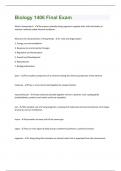
-
Biology 1406 Final Exam | 715 Questions and Answers(A+ Solution guide)
- Exam (elaborations) • 68 pages • 2023
- Available in package deal
-
- $13.49
- 1x sold
- + learn more
What is homeostasis - the process whereby living organisms regulate their cells and bodies to maintain relatively stable internal conditions What are the characteristics of living things - 1. Cells and Organization 2. Energy use and metabolism 3. Response to environmental changes 4. Regulation and homeostasis 5. Growth and Development 6. Reproduction 7. Biological Evolution atom - the smallest component of an element having the chemical properties of the element molecule - Two or more ...
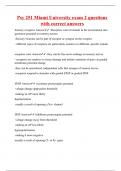
-
Psy 251 Miami University exam 2 questions with correct answers
- Exam (elaborations) • 17 pages • 2023
-
- $13.99
- 1x sold
- + learn more
Sensory receptors Answer -Receptors convert stimuli in the environment into generator potential on sensory neuron -Sensory Neurons can be part of receptor or synapse on the receptor - different types of receptors are particularly sensitive to different, specific stimuli receptors cont. Answer -they can be free nerve endings on sensory nerves - receptors are sensitive to tissue damage and initiate sensation of pain via graded membrane potential charge -they can be specialized, independent...
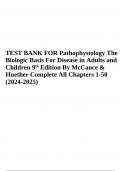
-
TEST BANK FOR Pathophysiology The Biologic Basis For Disease in Adults and Children 9th Edition By McCance & Huether Complete All Chapters 1-50 (2024-2025)
- Exam (elaborations) • 489 pages • 2024
-
- $34.49
- 1x sold
- + learn more
TEST BANK FOR Pathophysiology The Biologic Basis For Disease in Adults and Children 9th Edition By McCance & Huether Complete All Chapters 1-50 () Which statement best describes the cellular function of metabolic absorption? a. Cells can produce proteins. b. Cells can secrete digestive enzymes. c. Cells can take in and use nutrients. d. Cells can synthesize fats. ANS: C In metabolic absorption, all cells take in and use nutrients and other substances from their surroundings. The remaining...
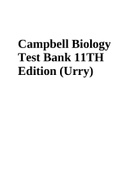
-
Campbell Biology Test Bank 11TH Edition (Urry)
- Exam (elaborations) • 1243 pages • 2023
-
- $29.49
- 7x sold
- + learn more
Campbell Biology Test Bank 11TH Edition (Urry) Cells are ________. A) only found in pairs, because single cells cannot exist independently B) limited in size to 200 and 500 micrometers in diameter C) characteristic of eukaryotic but not prokaryotic organisms D) characteristic of prokaryotic and eukaryotic organisms Answer: D Bloom's Taxonomy: Knowledge/Comprehension Section: 1.1 2) In comparison to eukaryotes, prokaryotes ________. A) are more structurally complex B) are larger C) ar...
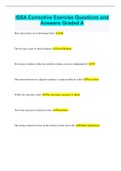
-
ISSA Corrective Exercise Questions and Answers Graded A
- Exam (elaborations) • 38 pages • 2023
-
Available in package deal
-
- $9.99
- 13x sold
- + learn more
ISSA Corrective Exercise Questions and Answers Graded A How many bones are in the human body? 206 The rib cage is part of which skeleton? Axial Skeleton How many vertebrae within the vertebral column can move independently? 24 Movement between two adjacent vertebrae is made possible by what? Facet Joints Wolffs law describes what? The way bones can grow or shrink New bone material is formed by what? Osteoblasts The strong connective tissue on the bottom of each foot is the: Plantar Aponeur...
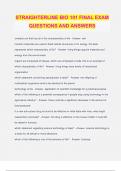
-
STRAIGHTERLINE BIO 101 FINAL EXAM QUESTIONS AND ANSWERS
- Exam (elaborations) • 31 pages • 2024
-
- $13.49
- 1x sold
- + learn more
STRAIGHTERLINE BIO 101 FINAL EXAM QUESTIONS AND ANSWERS smallest unit that has all of the characteristics of life - Answer- cell nutrient molecules are used to build cellular structures or for energy. this best represents which characteristic of life? - Answer- living things acquire materials and energy from the environment organs are composed of tissues, which are composed of cells. this is an example of which characteristic of life? - Answer- living things have levels of hierarchical o...
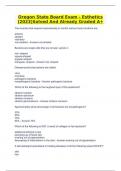
-
Oregon State Board Exam - Esthetics (2023)Solved And Already Graded A+
- Exam (elaborations) • 30 pages • 2023
-
- $17.99
- 4x sold
- + learn more
Oregon State Board Exam - Esthetics (2023)Solved And Already Graded A+ Oregon State Board Exam - Esthetics (2023)Solved And Already Graded A+ The muscles that respond automatically to control various body functions are: anterior striated voluntary non-striated - Answer non-striated Bacteria are single cells that are circular, spiral or: rod- shaped square-shaped angular-shaped triangular- shaped - Answer rod- shaped Disease-producing bacteria are called: virus microbes ...
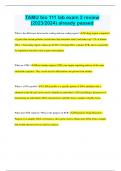
-
TAMU bio 111 lab exam 2 review (2023/2024) already passed
- Exam (elaborations) • 14 pages • 2023
- Available in package deal
-
- $9.99
- 2x sold
- + learn more
TAMU bio 111 lab exam 2 review (2023/2024) already passed What is the difference between the coding and non-coding region? Coding region: comprised of genes that encode proteins (instructions that determine traits) and makes up 1-2% of human DNA. • Noncoding region: makes up 98-99% of human DNA, contains STRs and is responsible for regulatory functions such as gene transcription. What are STRs? Short-tandem repeats (STRs) are unique repeating patterns of the same nucleotide sequence. They can...
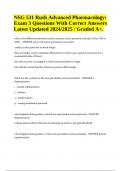
-
NSG 531 Rush Advanced Pharmacology: Exam 3 Questions With Correct Answers Latest Updated 2024/2025 / Graded A+.
- Exam (elaborations) • 33 pages • 2024
-
- $13.49
- 1x sold
- + learn more
NSG 531 Rush Advanced Pharmacology: Exam 3 Questions With Correct Answers Latest Updated 2024/2025 / Graded A+. what is the difference between cardiac myocyte action potential and that of the CNS or ANS? - ANSWER nerve cell action potential is very short cardiac action potential is much longer they are longer to have adequate filling time in order to get a good contraction for a reasonable bolus of blood the only way this can happen is if the action potential is longer this will also mean ...
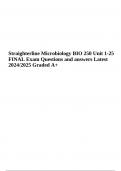
-
Straighterline Microbiology BIO 250 Unit 1-25 FINAL Exam Questions and answers Latest 2024/2025 Graded A+
- Exam (elaborations) • 49 pages • 2024
-
Available in package deal
-
- $14.99
- 1x sold
- + learn more
The sum total of all the microbes in a certain environment is termed the______ Select one: a. biofilm b. microbial niche c. microbiome d. phylogeny e. domain: Microbiome 2. Studies of the immune response to an infection caused by microorganisms would be performed by a/an _______. Select one: a. hypersensitivity specialist b. geomicrobiologist c. epidemiologist d. immunologist: Immunologist 3. Which of the following is NOT a recent discovery that has had a huge impact on the under...

Study stress? For sellers on Stuvia, these are actually golden times. KA-CHING! Earn from your study resources too and start uploading now. Discover all about earning on Stuvia


